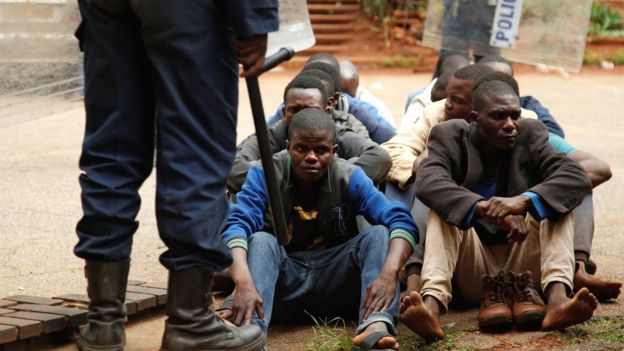Police and soldiers in Zimbabwe have been accused of carrying out “systematic torture” in their crackdown on protesters.
The claim was made by the Zimbabwe Human Rights Commission, a state-run institution promoting human rights and fundamental freedoms in Zimbabwe.
A monitoring report published by the Zimbabwe Human Rights Commission said “Torture was perpetrated through beating” victims “with baton sticks on their backs while they lay on the ground, including falanga, i.e. beating under the feet and beating them with open hands.”
There have been reports of over 12 deaths and hundreds of arrests made in the security crackdown.
The commission blamed some of the deaths recorded on “the amount of force” used by the troops. It said that was “evidenced by the injuries sustained by some of the Complainants that were interviewed and the deaths that occurred.”
Deaths reveal police brutality
The commission said most of the deaths “supported by medical records reveal a case of Police Brutality.”
The ongoing protests and agitations are over high fuel prices announced this month by the government.
The government increased petrol prices from $1.24 a litre to $3.31, with diesel up from $1.36 a litre to $3.1.
The Zimbabwe government has always blamed the opposition Movement for Democratic Change (MDC) of fueling violent protests.
The Zimbabwe Human Rights Commission however said the security forces handling of the protests used excessive force.
“The unleashing of live bullets on demonstrators and falanga on some Complainants are examples of excessive force that was used by the police amounting to Police Brutality often violating the right to life,” the report said.
Investigating crackdown
On Tuesday Zimbabwe President Emmerson Mnangagwa promised to investigate a brutal crackdown by the security forces on protesters.
President Mnangagwa had to cut short his foreign trip to return home. He had been criticized for traveling during the agitations.
Likewise, violence or misconduct by our security forces is unacceptable and a betrayal of the new Zimbabwe. Chaos and insubordination will not be tolerated. Misconduct will be investigated. If required, heads will roll 3/4
— President of Zimbabwe (@edmnangagwa) January 22, 2019
Mnangagwa now faces threats of possible impeachment according to some Zanu-PF MPs. One of Mnangagwa’s allies, the former deputy finance minister Terence Mukupe said there plots to remove the president.
I am in Harare… I will never sellout on my President.. you are wasting your time threatening to kill me and my family… I will never join your sick plot!!! Come get me and do as you please but my President is not going anywhere!!! We are going to shame you devilish people! pic.twitter.com/c9BqJtJzrw
— Terence Mukupe (@tmukupe) January 21, 2019
Mnangagwa worse than Mugabe?
Zimbabwe’s main opposition leader, Nelson Chamisa has claimed that President Emmerson “Mnangagwa is worse than” former leader, Robert Mugabe.
Nelson Chamisa who was reacting angrily to the security crackdown on protesters defended his claim saying Mnangagwa is “using the army against protesters, against demonstrators but also against the MDC in a very bad way…
In fact, all the enthusiasm and euphoria that gripped the nation when Mr Mugabe exited has just died down and petered out because what we are seeing is a worse off situation.”
Chamisa said the current “political instability is obviously affecting economic viability. You can’t have economic viability where there’s no political stability, where there’s no comprehensive economic reforms.
Corruption is rampant and Mr Mnangagwa is responsible for the corruption because he has been part of the system together under Mr Mugabe’s regime.”
Source: Africafeeds.com



